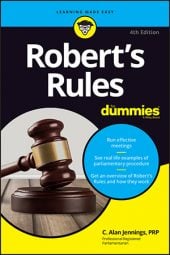After all, you’re busy, so special meetings had better be important, right? Now, because these meetings are special, the notice announcing them is special as well. You have to take a little more care with notices for special meetings than you do for regular meetings.
To be on the safe side and to eliminate doubt, you should always provide for written notice of special meetings to be sent within a specified time frame before the meeting. For example, your bylaws may state, “Notice of special meetings shall be mailed to the members at least 14 days but no more than 30 days before the meeting.”
The actual range for notice varies depending on the size of your group and the distance members must travel. The important point is that the range of dates for sending the notice must be reasonable, and everyone must be able to receive the notice in time to arrange their schedules to attend the meeting.All the notice principles for regular meetings still ring true for special meetings.
You can’t hold special meetings if your bylaws don’t provide for them. Check your bylaws before you worry about special meetings.
Calling a special meeting
If you need to have a meeting before the next regular meeting, go ahead and do so. But be sure that it’s important and can’t wait. And don’t try to cover anything more than what is absolutely necessary. Write your notice, include the pertinent details, and get out the notice as far in advance as you can. (Hopefully, your bylaws dictate the lead time requirements for special meeting notice. If not, you need to amend the bylaws to include this info.)Drawing up the special meeting notice
Make your notice simple and to the point. The subject of the meeting must be so urgent that it can’t wait. Don’t try to accomplish anything else at this meeting. Just write down exactly what you need to address and get the notice in the mail.Suppose Peter Piper just applied for membership on your Parched Peanut Purveyors panel. Piper promised to pick a peck of pickled peppers for each of your panelists if he’s permitted to petition for a position on the panel prior to the time his pickled pepper patch pays out.
Pickled peppers dry on the vine long before your next regular meeting. You really want Piper to belong to the club: Not only is he a person of patience and prestige, but you and the other panelists have postulated that the prospects for pickled peppers packed with parched peanuts is a profitable possibility. The opportunity to present Piper to the panel and permit his promise to perhaps profit the panel requires a special meeting.
In accordance with provisions of your bylaws, you call a special meeting and send a notice to all the voting members of the panel that reads as follows:
Parched Peanut Purveyors Panel
Notice of Special Meeting
A special meeting of the Parched Peanut Purveyors Panel will be held at the Peanut Patch on March 22 at 3:00 p.m. to peruse the petition of Peter Piper and prognosticate on the possibility of permitting Piper to hold a permanent post on our panel.
Please plan to participate.
Sincerely,
Lilbo Peep
Secretary
Now, as long as a quorum is present (the minimum number of voting members required to be present to validly conduct business in the name of the assembly), and provided that a majority of the panelists adopt the proposal, Peter Piper’s petition will pass. That fact will then be placed in the proceedings of the panel.
Special meetings always require previous notice. Special meeting notices not only must include the date, time, place, and location, but also must specify all the business to be included in the meeting. Nothing other than this business, and the various motions that allow the meeting to take care of this business, can be considered in a special meeting if it’s not included in the notice.
Be sure to call special meetings only when something must be addressed before the next regular meeting. Your time is important, so use this tool judiciously. Save everything that can wait for the next regular meeting.

